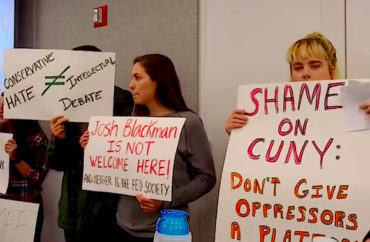
Dean says disruptive protest was ‘reasonable exercise’ of free speech
The administration of the City University of New York Law School will not punish students who disrupted a conservative professor’s lecture, with the dean of the law school calling the protest a “reasonable exercise of free speech.”
Student protesters last week crashed an event given by South Texas College of Law professor Josh Blackman, accusing the lawyer of supporting and promoting “white supremacy” in part because of his support for constitutional originalism. Blackman appeared at CUNY at the invitation of the university’s student chapter of the Federalist Society, a conservative legal group. He recounted the incident on his blog.
Dismissing the possibility of punishing the disruptors, Dean of CUNY Law School Mary Lu Bilek wrote in a statement: “For the first eight minutes of the 70-minute event, the protesting students voiced their disagreements. The speaker engaged with them. The protesting students then filed out of the room, and the event proceeded to its conclusion without incident.”
“This non-violent, limited protest was a reasonable exercise of protected free speech, and it did not violate any university policy,” the Dean’s statement concluded.
In an email to The College Fix, Blackman said that the protesters caused a marked disruption to his planned speech. “I was not able to give the presentation I wanted–both in terms of duration and content–because of the hecklers,” he said.
“The Dean is simply incorrect when said [sic] the protest was only ‘limited’,” he added.
The decision to not punish the protesters comes after the school had previously warned students that disruptive behavior is prohibited at the university.
In a statement issued by Bilek prior to the event and posted by Blackman to his blog, the law dean said: “University policy provides guidelines for how to express disagreement lawfully (including through demonstrations), defines prohibited conduct, and details the procedure for handling disruptive demonstrations at CUNY facilities.”
The school’s Policy on Freedom of Expression and Expressive Conduct lays out examples of “prohibited conduct” and guidelines for “Conducting Demonstrations” for dissenters to remain cognizant.
“Shouting down or otherwise preventing a speaker from delivering remarks at a program or event at a college campus or ejecting participants in a public forum or meeting because of their viewpoint” are grounds for students being “subject to discipline,” the bylaws state.
The policy further states: “Members of the University community may not demonstrate in a manner that materially impedes or disrupts the University’s educational activities (including, but not limited to classes as well as public conferences and forums),” reads the handbook.
Neither Bilek nor the university responded to requests for comment on Monday afternoon regarding the discrepancy between university policy and the administration’s response to the protesters.
On his blog, Blackman describes the moment at which the protesters crashed his event: “At this point, about three minutes in, I had only managed to say a single sentence. I decided to start, though I abandoned my prepared remarks. Instead, I decided to respond to attacks the student’s made against me in flyers that were distributed throughout the school.”
Blackman tried to engage the student protesters, telling them: “Let me speak. Let me speak. About a dozen protesters were standing directly behind Blackman and interjecting with their own remarks as he was trying to give his speech. The students refused to step away from Blackman when asked to do so.
“Had they stayed there, and not made any noise, it would have been fine with me,” wrote Blackman on his blog.
According to the university’s student handbook, “Each member of the academic community or an invited guest has the right to advocate his position without having to fear abuse—physical, verbal, or otherwise from others supporting conflicting points of view.”
Further, the handbook highlights that obstruction to freedom of speech is prohibited. “A member of the academic community shall not intentionally obstruct and/or forcibly prevent others from the exercise of their rights. Nor shall she/he interfere with the institution’s educational process or facilities, or the rights of those who wish to avail themselves of any of the institution’s instructional, personal, administrative, recreational, and community services.”
On the blog The Volokh Conspiracy, George Mason University law professor David Bernstein said that CUNY’s law school “needs to fire its dean.”
“[S]urely it can’t be consistent with free speech and university policy to disrupt a speaker. Indeed, that was the law school’s position before the talk,” he wrote.
Bernstein suggested that “free-speech provocateurs” should “consider disrupting the first eight minutes of each of CUNY law school’s classes this week, including by forcing the professor to run a gauntlet of protesters threatening to block entry into their classrooms.”
“After all, we now know that the law school’s official position is that eight minutes of disruption is ‘a reasonable exercise of free speech’,” he wrote.
On Twitter, Brooklyn College and CUNY Graduate Center professor KC Johnson characterized the school’s position as: “Disruptions [are] fine, provided they don’t consume [an] unspecified % of speech.”
Blackman told The College Fix that he has “never before been protested” and that he was “genuinely surprised by the heckling,”
“It is very unfortunate that the students were not willing to hear me ideas or engage in the arena of ideas,” he said.
MORE: Angry mob shuts down Blue Lives Matter speech at Claremont McKenna College
MORE: Conservative scholar shouted down at Middlebury College, forced to leave lecture hall
IMAGE: YouTube
Like The College Fix on Facebook / Follow us on Twitter






Please join the conversation about our stories on Facebook, Twitter, Instagram, Reddit, MeWe, Rumble, Gab, Minds and Gettr.